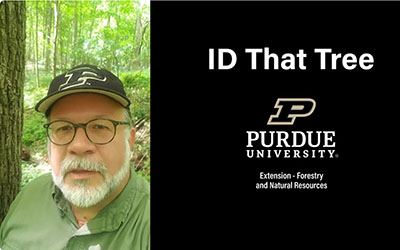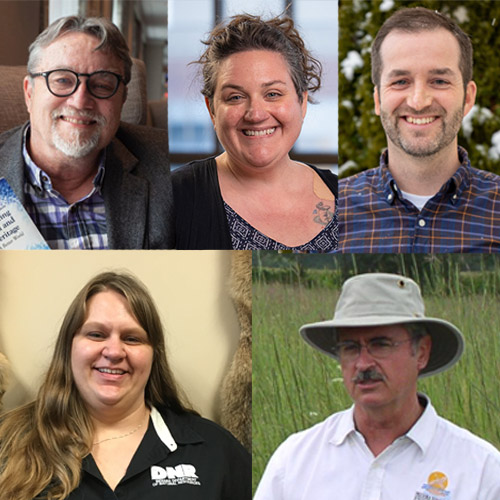Forestry & Natural Resources
Hardiman Receives Early Career Teaching Award
Dr. Brady Hardiman, assistant professor of forest and urban ecology, was named as the 2020-21 recipient of the Richard L. Kohls Outstanding Early Career Teaching Award this week.
“I am humbled to receive this recognition from my colleagues and students,” Hardiman said. “Each class I teach is unique as I constantly experiment with new ways to effectively convey the subject matter in a way that resonates with students. This award is evidence that Purdue and FNR are truly committed to supporting innovative teaching and I am grateful to be in such good company.”
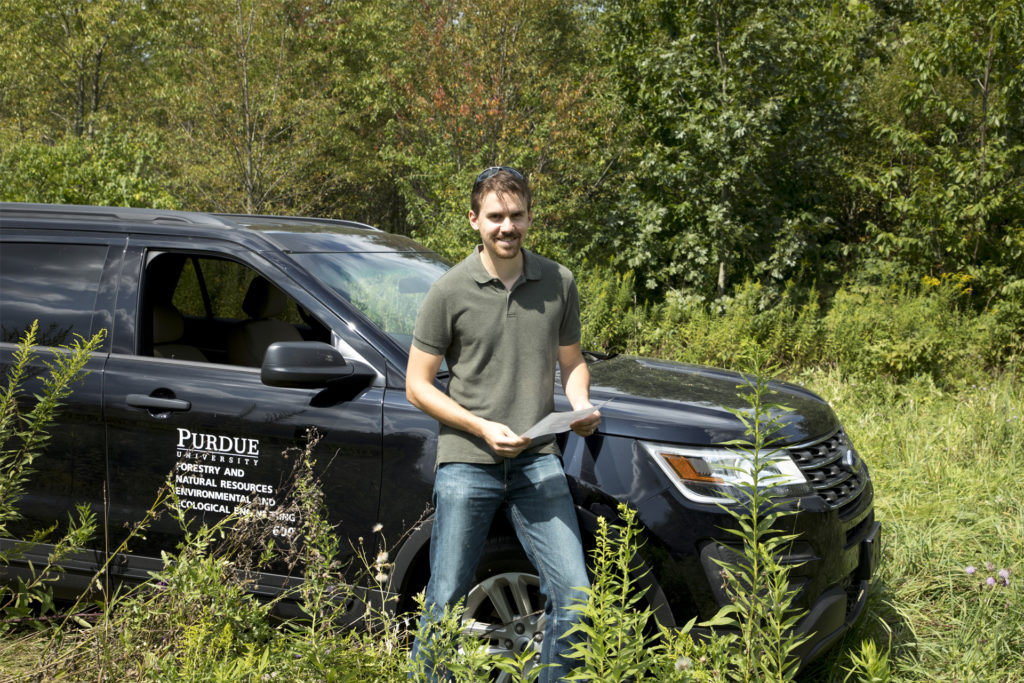 Hardiman joined the faculty in Purdue Forestry and Natural Resources in January 2016 as an assistant professor of forestry and natural resources and environmental and ecological engineering. He teaches FNR 210 Natural Resource Information Systems in the spring semesters and FNR 586 Urban Ecology in the fall. He also has taught FNR 372 Forestry Practicum and FNR 598 Environmental Sensors and Data.
Hardiman joined the faculty in Purdue Forestry and Natural Resources in January 2016 as an assistant professor of forestry and natural resources and environmental and ecological engineering. He teaches FNR 210 Natural Resource Information Systems in the spring semesters and FNR 586 Urban Ecology in the fall. He also has taught FNR 372 Forestry Practicum and FNR 598 Environmental Sensors and Data.Hardiman earned his bachelor’s degree in biology from Ashland University in 2003. He completed his PhD in evolution, ecology and organismal biology at The Ohio State University in 2012, doing his dissertation on the Resilience of Forest Carbon Storage through Disturbance and Succession.
Before coming to Purdue, Hardiman was a postdoctoral associate in the Ecological Forecasting Laboratory and the Carbon Cycle Science and Urban Ecology Laboratory at Boston University, where he worked on forest community risk and resilience to climate change and the role of urban vegetation in regional carbon budgets.
In 2019, Hardiman published several papers, including one on Structural diversity as a predictor of ecosystem function and another on the Implications of climate change for managing urban green infrastructure: an Indiana, US case study . Thus far in 2020, he has published five articles, including Compatibility of aerial and terrestrial LiDAR for quantifying forest structural diversity.
The Hardiman lab is researching the mechanisms of long-term resilience of forest carbon storage, biogenic carbon emissions in the urban ecosystem and the effects of structural and biological diversity on forest productivity.
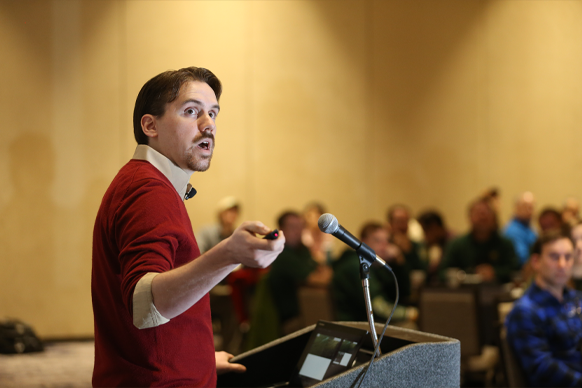 Hardiman follows Dr. Elizabeth Flaherty as the only other FNR recipient of the early career award, which was introduced in 2010. Flaherty was honored in 2016.
Hardiman follows Dr. Elizabeth Flaherty as the only other FNR recipient of the early career award, which was introduced in 2010. Flaherty was honored in 2016.“We are absolutely thrilled that Dr. Hardiman received this award for his outstanding teaching,” FNR department head Bob Wagner said. “Nowhere is Brady’s enthusiasm and talent for teaching more clear than in his FNR 210 - Natural Resource Information Management course. This is the core course required for our students to understand and develop the computer skills needed in geographic information systems (GIS). Brady’s teaching approach has elevated that course substantially over the past several years.”
The Kohls Outstanding Early Career Award is given annually to an individual who has demonstrated a commitment to a career in teaching and working with students, who has no more than seven consecutive years of higher education experience. Nominees are assessed on instructional effectiveness, course instruction improvement and innovation, contact with students outside the classroom, service as a research mentor for undergraduates outside of normal classroom activities, and participation on committees related to undergraduate education.
In its nomination, the FNR Awards Committee stated that Hardiman “seeks to create engaged citizens who are scientifically literate critical thinkers. He encourages students to evaluate ideas from multiple perspectives and to build connections between concepts to deepen and reinforce learning. His teaching emphasizes both content and the skills critical for student success throughout their careers. He challenges students to apply current knowledge and cutting-edge methods to understanding and solving contemporary societal problems.”
Hardiman utilizes diverse teaching methods to both keep students engaged and supports different learning modalities. His Urban Ecology class is a prime example of this with a lecture format that incorporates mini-activities such as minute papers, think-pair-share and jigsaw on Mondays, small-group or whole class discussion of peer-reviews scientific publications on Wednesdays and guest speakers or group projects focused on solving challenges of urban ecosystems on Fridays. Hardiman also includes inquiry-based, hands-on projects that require students to apply concepts from lectures and their discussions of scientific literature.
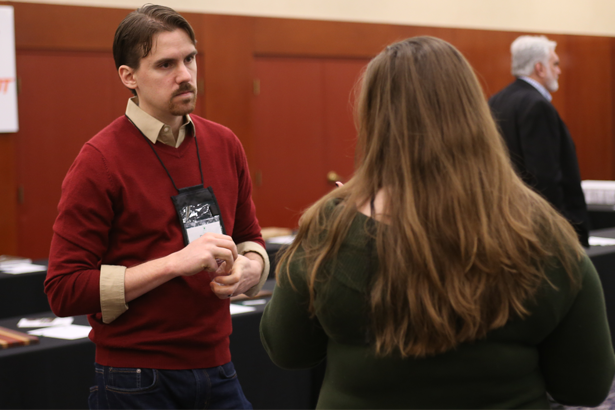 Students have commented that:
Students have commented that:“This class was so enjoyable and the structure was one that was conducive to learning… Every class was different and it helped me learn more from the class... Incorporating work outside the classroom or computer screen makes students feel more connected to the course content.”
One student stated:
“What an awesome class. I would highly recommend it to anyone interested in this subject matter. The class was well organized and Brady showed enthusiasm and passion throughout the semester. There was a wide range of very interesting, intriguing and enlightening material presented and it all fit well within the scope of the class. One of the best classes I’ve gotten to take here. I have truly grown as a person and a scholar as a result.”
Hardiman also is know for his outside the box hands-on in-class demonstrations, such as using a wire-frame globe and a flashlight to illustrate the distortion of map projections by projecting a shadow of a 3D object onto a 2D surface in his Natural Resources Information Systems course. This class, the largest lab course in FNR, is a gateway course to geographic information system (GIS) mapping and data science and is required for all FNR and Natural Resource and Environmental Science majors, laying the groundwork for future courses.
“I believe Dr. Hardiman is doing a great job of teaching the GIS course,” said Dr. Songlin Fei, professor and Dean’s Chair of Remote Sensing. “This has clearly been demonstrated in students’ competencies and interests in the three subsequent courses I have been teaching: FNR 35300, FNR 37200 and FNR35500, all of which utilize GIS. This upward trend has been especially noticeable during the last year after he reorganized his course with new materials and based on the new ArcGIS Pro platform. Well done!”’
In addition to his work in the classroom, Hardiman serves as the faculty mentor to 10 environmental and ecological engineering students and has served as a research mentor to six undergraduate independent research students since 2016. He also is a member of the EEE Academic committee and the College of Agriculture Grade Appeals Committee.
The full list of College of Agriculture Award winners is here: Past Awards, while FNR’s all-time awards list is here.




